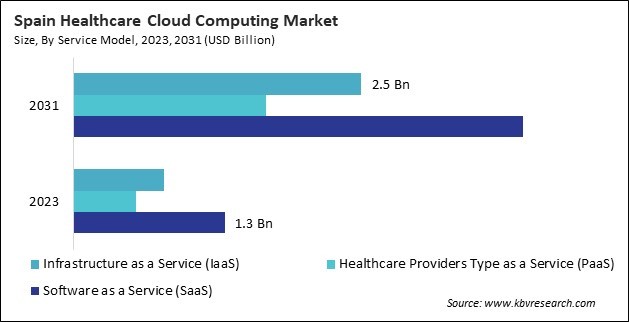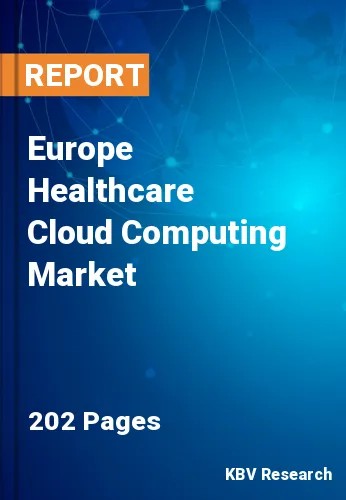The Europe Healthcare Cloud Computing Market would witness market growth of 16.6% CAGR during the forecast period (2024-2031).
The Germany market dominated the Europe Healthcare Cloud Computing Market by Country in 2023, and would continue to be a dominant market till 2031; thereby, achieving a market value of $9,420.1 million by 2031. The UK market is experiencing a CAGR of 15.7% during (2024 - 2031). Additionally, The France market would exhibit a CAGR of 17.5% during (2024 - 2031).

Cloud computing also helps healthcare providers reduce IT costs and comply with strict data security regulations. For instance, according to NHS Digital, the National Health Service (NHS) in the U.K. has saved £75 million annually by transitioning to cloud-based services. It is anticipated that the healthcare cloud computing market will continue to expand, fueled by the growing volume of healthcare data, the necessity for scalable storage, and regulatory pressures. These advancements enable efficient management of healthcare operations and improve patient care through better data accessibility and security.
The expanding utilization of electronic health records (EHRs) in healthcare systems worldwide is one of the primary factors driving the healthcare cloud computing market. EHRs, which digitize patient information and make it accessible to healthcare providers, have become essential for improving care delivery, enhancing patient safety, and reducing administrative burdens. However, as EHRs have become more widespread, scalable storage solutions are needed to handle the immense amounts of data generated by patient records.
The demand for cloud-based healthcare solutions is being driven by the growing disease burden in the United Kingdom, particularly those associated with chronic conditions like diabetes and cardiovascular diseases. To enhance patient outcomes through improved data analytics and population health management, the National Health Service (NHS) is increasingly utilizing cloud computing to manage large volumes of patient data related to chronic disease management.
The NHS Long-Term Plan highlights the role of cloud computing in supporting remote monitoring and predictive analytics for chronic disease care. This initiative is helping healthcare providers make informed decisions and optimize treatment pathways, contributing to the growth of healthcare cloud adoption in the UK. Thus, the region will present lucrative growth opportunities for the market throughout the forecast period.
Free Valuable Insights: The Global Healthcare Cloud Computing Market will Hit USD 142.7 Billion by 2031, at a CAGR of 17%
Based on Application, the market is segmented into Clinical Information Systems (CIS) {Electronic Health Records (EHR), Picture Archiving and Communication System (PACS), Radiology Information System (RIS), and Others (COPE, PIS, etc.)}, and Non-clinical Information Systems (NCIS) {Revenue Cycle Management (RCM), Billings & Accounts Management Solution, and Others (SCM, HIE, etc.)}. Based on Service Model, the market is segmented into Software as a Service (SaaS), Platform as a Service (PaaS), and Infrastructure as a Service (IaaS). Based on Deployment Model, the market is segmented into Public Cloud, Private Cloud, and Hybrid Cloud. Based on End User, the market is segmented into Healthcare Providers (Hospitals, Diagnostic and Imaging Centers, Pharmacies, and Ambulatory Centers) and Healthcare Payers (Private Payers and Public payers). Based on countries, the market is segmented into Germany, UK, France, Russia, Spain, Italy, and Rest of Europe.
By Application
By Service Model
By Deployment Model
By End User
By Country
Our team of dedicated experts can provide you with attractive expansion opportunities for your business.

